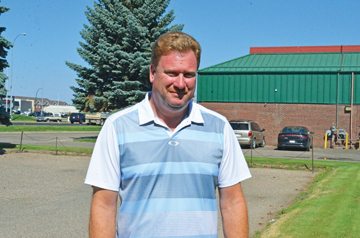Current Temperature
4.1°C
Cypress County could see a drastic revenue loss with assessment changes
Posted on August 5, 2020 by 40 Mile Commentator Southern Alberta Newspapers file photo
MORE MOVEMENT NEEDED: Cypress County Reeve Dan Hamilton has requested a copy of the HEMS review after getting very little response from Health MInister Tyler Shandro.
Southern Alberta Newspapers file photo
MORE MOVEMENT NEEDED: Cypress County Reeve Dan Hamilton has requested a copy of the HEMS review after getting very little response from Health MInister Tyler Shandro.By Justin Seward
Commentator/Courier
Cypress County has joined the Rural Municipalities Association (RMA) and other rural municipalities across province in sharing its concerns about the proposed assessment changes.
Assessment changes could leave Cypress County with reduced revenues currently provided through property taxes of oil and gas companies.
“The situation is dire,” said County Reeve Dan Hamilton, speaking about the potential for lost tax revenue created by these proposed changes.
The Province of Alberta notified rural municipalities a couple of weeks ago that it is considering four potential models to change the assessment and taxation model.
RMA has a summary document on its website and “it was according to the Government of Alberta, the review was intended to “modernize” the assessment model for oil and gas properties to enhance industry competitiveness while insuring municipal viability.”
RMA could not provide an update to members on the review process, while the government has finalized the proposed changes and briefed relevant provincial ministers and decision makers on the recommendations.
All four models look at base costs, depreciation, land assessment, statutory levels and other adjustments.
In accordance to the RMA report, the proposed scenarios would see revenue cuts anywhere from seven per cent in scenario a to 20 per cent in scenario D which is average of all the 69 RMA municipalities.
“We will have some of member municipalities lose as much as 30 to 40 per cent of their tax base,” said Al Kemmere, RMA president.
“That means the residents will have to pick that up or services will have to be eliminated.”
Cypress County could face a revenue loss of 16 per cent to 22 per cent, depending on the scenario.
“In the worst-case scenario, this means lost tax revenue of $7.8 million in the first year alone,” said Hamilton.
The county will have to adjust its operations in one or more of following ways: hiking the residential tax from 132.2 per cent to 181.3 per cent, the business and industrial tax from 39.9 per cent to 63.6 per cent and a farm tax increase of 1,550 per cent.
Cuts and changes will have to be made to non-subsidized recreation, including ice rates, closure of facilities and reduced park maintenance.
There will be reduced or eliminated improvements to aged municipal infrastructure, decreased road maintenance, increased cost on municipal utilities and services, reduced bylaw enforcement, reduction or cancellation of dust control program and significant road bans could be in put in place to save infrastructure.
“Even if we cut our operating expenses by 70 per cent we would still need a tax increase to make up this lost revenue,” said Hamilton.
“The potential impact on Cypress County, frankly, is insurmountable.”
The province has not made a decision on any of these proposals. A decision is expected in the next four weeks.
County council is requesting that the province reconsider the proposed reassessment changes.
In the mean time, residents are encouraged to have their voice heard and contact local MLAs Michaela Glasgo and Drew Barnes to share their thoughts on the matter.
“We were informed in December last year that we were going to be invited to participate in somewhat of a process and it started in January,” said Kemmere.
“… And knowing that we had such a tight timeline, we felt we’d get ourselves as well prepared as possible. We loaded all our member municipalities with information and how from a high level this would affect them.”
Kemmere says it’s fairly new to the government as Premier Kenney was only updated on July 20 and MLAs on July 21 respectively.
“What we have asked our members is here is the high level of information, how this is going to affect you. You need to engage with your MLAS and with your public to let them know the impact of this and how this is going to affect their taxes in the future,” said Kemmere.
Kemmere believes municipal tax base should be the area to fix the oil gas issues.
“We as municipalities have one stream of income and that’s our property tax base,” he said.
“Whereas the federal government and provincial government have multiple tools of revenue generation. If the need is there, they can help out the oil and gas industry much easier than we can.”
Leave a Reply
You must be logged in to post a comment.

